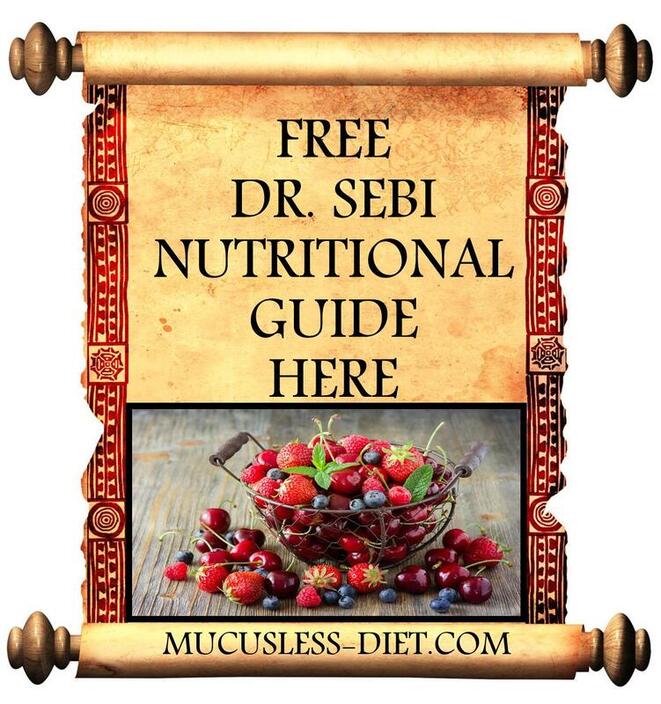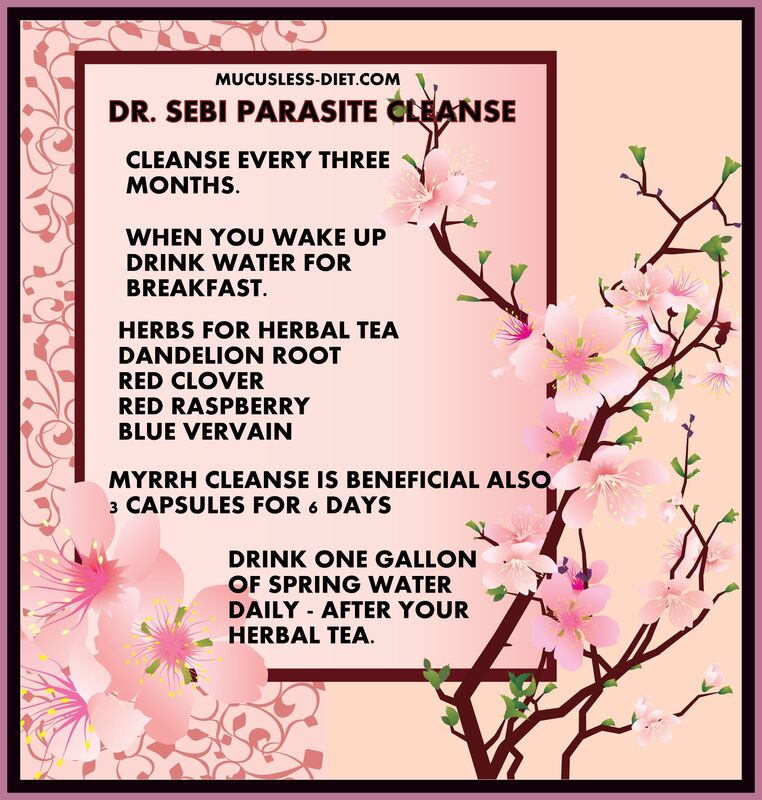Exactly What is Excess Mucus And
the Foods That Cause this?
WRITTEN BY DR. IMOBHIO OKHIFUN,MD
THIS ARTICLE IS COPYWRITTEN FOR MUCUSLESS-DIET.COM ONLY. ALL RIGHTS RESERVED.
THIS ARTICLE IS COPYWRITTEN FOR MUCUSLESS-DIET.COM ONLY. ALL RIGHTS RESERVED.
Dr. Sebi said , " if there is excess mucous in the bronchial tubes, the disease is Bronchitis; if it is in the lungs, the disease is Pneumonia; in the pancreatic duct, it is Diabetes; in the joints Arthritis."
Dr. Sebi "mucus is the cause of every disease," the best ways to get rid of phlegm after eating and
clear mucus from your throat."
clear mucus from your throat."

Hearing the word “mucus” naturally grosses anyone out, right? Mucus may seem an irritating substance our bodies secrete, but it is actually produced to protect our bodies from invasion by bacteria or other pathogens.
Mucus is an aqueous fluid produced by mucous membranes that line most hollow organs including the gastrointestinal tract, sinuses, airway tract, and genital organs, which are connected to the outside of the body.
Mucus is an aqueous fluid produced by mucous membranes that line most hollow organs including the gastrointestinal tract, sinuses, airway tract, and genital organs, which are connected to the outside of the body.
When a foreign body irritates or invades a tissue lining, inflammation sets in. Inflammation is like a conflict between the body’s defense cells and invading pathogens. During inflammation, the immune cells trigger the release of a chemical called histamine. This chemical causes the blood vessels to dilate, allowing more blood flow into the site of inflammation. This not only allows more white blood cells to be deployed to the site, but it also allows the mucous glands to secrete more mucus.
Mucus is one of the weapons the mucous cells employ in combating these pathogens. The trapped pathogens, in turn, are then destroyed by the body’s defense cells.
This fluid contains enzymes and antibodies that break down pathogenic materials that our bodies are exposed to. However, while the body may mean well when it produces mucus, its chronic secretion may mean the body is in a state of chronic inflammation, which increases the risk of several health problems including cancer, diabetes, and heart disease.
The Problem with Excess Mucus Secretion
The body is pulled continuously by two opposing forces - pro-inflammatory forces and anti-inflammatory forces. These pro-inflammatory forces comprise the toxic chemicals produced in the body such as cytokines, free radicals, or toxins produced by bacteria or other pathogens that enter the body. The anti-inflammatory forces, on the other hand, include antioxidants and immune cells that help to ward off the infectious agents.
When the pro-inflammatory forces are greater than the anti-inflammatory elements can contain, inflammation results. And when there is inflammation, the body produces mucus, in large amounts.
The source of inflammation vary; it could be environmental (airborne toxins, chemicals, spores, etc.), infectious (bacteria, viruses, fungi), or nutritional. Yes, nutritional. What we eat could trigger inflammation and cause excess mucus production.
So the first step in removing excess mucus from our bodies is to find out what is causing it.
For many people, certain foods are major culprits. Furthermore, in people with diseases that cause inflammation and oversecretion of mucus, these foods may aggravate it. In this article, we focus on the foods that trigger the inflammatory process that leads to excess secretion of mucus.
This is essential to help identify these foods and eliminate them from our diets.
Foods that Trigger Excess Mucus Production
Foods that trigger excess production of mucus in the body include:
Mucus is one of the weapons the mucous cells employ in combating these pathogens. The trapped pathogens, in turn, are then destroyed by the body’s defense cells.
This fluid contains enzymes and antibodies that break down pathogenic materials that our bodies are exposed to. However, while the body may mean well when it produces mucus, its chronic secretion may mean the body is in a state of chronic inflammation, which increases the risk of several health problems including cancer, diabetes, and heart disease.
The Problem with Excess Mucus Secretion
The body is pulled continuously by two opposing forces - pro-inflammatory forces and anti-inflammatory forces. These pro-inflammatory forces comprise the toxic chemicals produced in the body such as cytokines, free radicals, or toxins produced by bacteria or other pathogens that enter the body. The anti-inflammatory forces, on the other hand, include antioxidants and immune cells that help to ward off the infectious agents.
When the pro-inflammatory forces are greater than the anti-inflammatory elements can contain, inflammation results. And when there is inflammation, the body produces mucus, in large amounts.
The source of inflammation vary; it could be environmental (airborne toxins, chemicals, spores, etc.), infectious (bacteria, viruses, fungi), or nutritional. Yes, nutritional. What we eat could trigger inflammation and cause excess mucus production.
So the first step in removing excess mucus from our bodies is to find out what is causing it.
For many people, certain foods are major culprits. Furthermore, in people with diseases that cause inflammation and oversecretion of mucus, these foods may aggravate it. In this article, we focus on the foods that trigger the inflammatory process that leads to excess secretion of mucus.
This is essential to help identify these foods and eliminate them from our diets.
Foods that Trigger Excess Mucus Production
Foods that trigger excess production of mucus in the body include:
Red meat
Red meat is high in protein and pro-inflammatory chemicals that can trigger mucus build up. High-fat and processed red meats are common culprits because they are associated with the release of pro-inflammatory substances and free radicals, which trigger mucus production in the body.
Processed meat is high in advanced glycation end products (AGEs) than other types of meats. These substances are released when fat or protein mixes with sugar in the blood, and they are known to trigger inflammation.
High intake of red meat is also associated with increased blood levels of uric acid, a byproduct of naturally occurring substances called purines. Uric acid has been shown to promote inflammation.
Furthermore, meat is high in amino acid, methionine, which triggers inflammation and mucus production. High intake of meat is also associated with increased levels of arachidonic acid, which also stimulates mucus production.
Avoiding a diet high in red meat is one sure way of lowering mucus production in your body, and keeping inflammation at bay.
Red meat is high in protein and pro-inflammatory chemicals that can trigger mucus build up. High-fat and processed red meats are common culprits because they are associated with the release of pro-inflammatory substances and free radicals, which trigger mucus production in the body.
Processed meat is high in advanced glycation end products (AGEs) than other types of meats. These substances are released when fat or protein mixes with sugar in the blood, and they are known to trigger inflammation.
High intake of red meat is also associated with increased blood levels of uric acid, a byproduct of naturally occurring substances called purines. Uric acid has been shown to promote inflammation.
Furthermore, meat is high in amino acid, methionine, which triggers inflammation and mucus production. High intake of meat is also associated with increased levels of arachidonic acid, which also stimulates mucus production.
Avoiding a diet high in red meat is one sure way of lowering mucus production in your body, and keeping inflammation at bay.
Refined grains
Examples of refined grains include cookies, noodles, pasta, and bread. Refined grains have much of their fiber content depleted. Fiber feeds the healthy bacteria in the gut, and a high intake of refined carbs may negatively impact gut health by promoting the growth of pathogenic bacteria.
In addition, the starch in refined grains has a high glycemic index. This means that it causes blood glucose to rise quickly. This is associated with increased levels of AGEs, which are pro-inflammatory and cause mucus build-up.
Avoid refined grains in your diet to lower mucus production in your body. Take whole grains (such as barley, buckwheat, brown rice, and oatmeal) instead of refined grains. Whole grains are high in fiber, B-vitamins, selenium, iron, folate, and magnesium, which help to mop up toxic chemicals from the body. These nutrients are usually removed when producing refined grains.
Refined sugars
Foods high in refined or added sugars include cakes, bread, pastries, candy, sweetened sodas, and ice cream. These foods contain large amounts of added sugars, and the main types of refined sugars in many Western foods are table sugar (sucrose) and high-fructose corn syrup.
The problem with these sugars is their pro-inflammatory effects. High intake of refined sugars is also associated with increased blood levels of uric acid, which promotes inflammation. These foods also counteract the effects of many of the body's antioxidants, including omega-3 fatty acids.
Furthermore, refined sugars cause the gut to become easily permeable, potentially causing inflammation and mucus production. Refined sugars also promote the release of the pro-inflammatory AGEs.
Avoid refined sugars if you want to keep mucus production at bay. When you feel that sugar craving, take fresh fruits, such as apples, berries, dates, bananas, cherries, and mangoes, instead.
Refined Oils
Examples of refined oils include vegetable oils, corn oil, soybean oil, and canola oil. Refined oils have a high omega-6 fatty acid content, and this fatty acid promotes inflammation.
These oils may also have a high content of trans fats, which increases the body’s content of pro-inflammatory markers.
Avoid refined oils in your diet to lower your risk of inflammation and mucus production. You may also use healthier options such as olive oil. Olive oil, for instance, contains large amounts of the monounsaturated fat, oleic acid, which protects against inflammation. It also contains modest amounts of vitamin E and K, which protect the body against inflammatory chemicals.
Examples of refined oils include vegetable oils, corn oil, soybean oil, and canola oil. Refined oils have a high omega-6 fatty acid content, and this fatty acid promotes inflammation.
These oils may also have a high content of trans fats, which increases the body’s content of pro-inflammatory markers.
Avoid refined oils in your diet to lower your risk of inflammation and mucus production. You may also use healthier options such as olive oil. Olive oil, for instance, contains large amounts of the monounsaturated fat, oleic acid, which protects against inflammation. It also contains modest amounts of vitamin E and K, which protect the body against inflammatory chemicals.
Dairy products
Dairy products, such as milk and yogurt, contain a protein called casein, which stimulates the mucous glands to secrete mucus. These products also contain lactose, which can also cause mucus to build up.
However, the evidence in this regard is conflicting, as some studies show that dairy products can lower inflammation. This depends on the product and the components of the product as dairy is not a single food.
Therefore, it is safe to say people should avoid high-fat dairy products, which contain huge amounts of saturated fat that may cause excessive mucus production.
Soy products including tofu, soy milk, and soy cheese
Soy products are a common cause of food allergies. These foods stimulate our bodies’ mucous membranes to secrete mucus in large amounts. Therefore, avoiding them may be your best bet for solving this problem. They trigger a hypersensitivity reaction that sends the immune system into hyperdrive. This causes inflammation and mucus buildup in the digestive system and the airway.
Furthermore, most of the soy products produced in the United States are genetically modified. Consuming them could cause the release of harmful substances in the body, which may trigger inflammation.
Soy is also one of the main allergenic foods because it cross-reacts with gluten. That means if you are sensitive to gluten, your body may also trigger an immune response when you consume soy products.
Soy products are a common cause of food allergies. These foods stimulate our bodies’ mucous membranes to secrete mucus in large amounts. Therefore, avoiding them may be your best bet for solving this problem. They trigger a hypersensitivity reaction that sends the immune system into hyperdrive. This causes inflammation and mucus buildup in the digestive system and the airway.
Furthermore, most of the soy products produced in the United States are genetically modified. Consuming them could cause the release of harmful substances in the body, which may trigger inflammation.
Soy is also one of the main allergenic foods because it cross-reacts with gluten. That means if you are sensitive to gluten, your body may also trigger an immune response when you consume soy products.
Alcoholic Beverages
Alcoholic beverages, even if taken for a short period, trigger an excessive release of histamine, a chemical that mediates inflammation and excess secretion of mucus. Alcohol intake may also deplete the immune cells, making the tissues vulnerable to bacterial invasion and inflammation.
In addition, high alcohol consumption is associated with a condition called leaky gut. In leaky gut, bacterial toxins escape in large amounts through the colon into the body, causing widespread inflammation.
Examples of alcohol beverages that cause mucus hypersecretion include beer, gin, neutral spirit, rum, and caffeinated alcohol drinks.
The best way to limit mucus production in your body is to avoid these foods. However, you also need to take foods that lower mucus hypersecretion to tilt your body into an anti-inflammatory state.
Summary
Mucus production often results from inflammation, and food remains a leading factor that promotes inflammation. Many foods in our diet may be promoting inflammation in our bodies. As a result, you may need to rethink your diet plan and change your food list when going grocery shopping to avoid those that increase inflammation and mucus production.
Alcoholic beverages, even if taken for a short period, trigger an excessive release of histamine, a chemical that mediates inflammation and excess secretion of mucus. Alcohol intake may also deplete the immune cells, making the tissues vulnerable to bacterial invasion and inflammation.
In addition, high alcohol consumption is associated with a condition called leaky gut. In leaky gut, bacterial toxins escape in large amounts through the colon into the body, causing widespread inflammation.
Examples of alcohol beverages that cause mucus hypersecretion include beer, gin, neutral spirit, rum, and caffeinated alcohol drinks.
The best way to limit mucus production in your body is to avoid these foods. However, you also need to take foods that lower mucus hypersecretion to tilt your body into an anti-inflammatory state.
Summary
Mucus production often results from inflammation, and food remains a leading factor that promotes inflammation. Many foods in our diet may be promoting inflammation in our bodies. As a result, you may need to rethink your diet plan and change your food list when going grocery shopping to avoid those that increase inflammation and mucus production.
Resources
Chai W, Morimoto Y, Cooney RV, et al. Dietary Red and Processed Meat Intake and Markers of Adiposity and Inflammation: The Multiethnic Cohort Study. J Am Coll Nutr. 2017;36(5):378–385. Available on https://www.ncbi.nlm.nih.gov/pmc/articles/PMC5540319/
Masters RC, Liese AD, Haffner SM, Wagenknecht LE, Hanley AJ. Whole and refined grain intakes are related to inflammatory protein concentrations in human plasma. J Nutr. 2010;140(3):587–594.
Catherine Guthrie. The Truth about Refined Grains. Experience Life. Available on https://experiencelife.com/article/the-truth-about-refined-grains/
Wu SH, Shu XO, Chow WH, et al. Soy food intake and circulating levels of inflammatory markers in Chinese women. J Acad Nutr Diet. 2012;112(7):996–1004.e10044. Available on https://www.ncbi.nlm.nih.gov/pmc/articles/PMC3727642/
Waldschmidt TJ, Cook RT, Kovacs EJ. Alcohol and inflammation and immune responses: summary of the 2006 Alcohol and Immunology Research Interest Group (AIRIG) meeting. Alcohol. 2008;42(2):137–142. Available on
https://www.ncbi.nlm.nih.gov/pmc/articles/PMC2377009/
Six Foods that Cause Inflammation. Healthline. Available on https://www.healthline.com/nutrition/6-foods-that-cause-inflammation#section7











